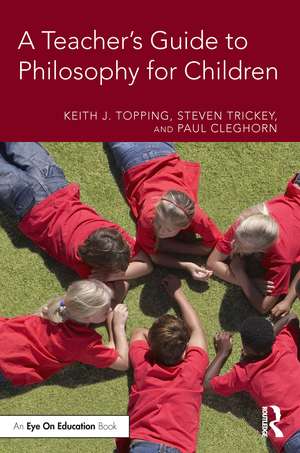A Teacher's Guide to Philosophy for Children
Autor Keith J. Topping, Steven Trickey, Paul Cleghornen Limba Engleză Paperback – 25 iun 2019
Based on the actual experiences of educators in diverse and global classroom contexts, this comprehensive guide gives you the tools you need to introduce philosophical thinking into your classroom, curriculum and beyond. Drawing on research-based educational and psychological models, this book highlights the advantages gained by students who regularly participate in philosophical discussion: from building cognitive and social/emotional development, to becoming more informed citizens. Helpful tools and supplementary online resources offer additional frameworks for supporting and sustaining a higher level of thinking and problem-solving among your students.
This practical guide is essential reading for teachers, coaches and anyone wondering how you can effectively teach philosophy in your classroom.
Preț: 267.87 lei
Nou
Puncte Express: 402
Preț estimativ în valută:
51.26€ • 53.66$ • 42.41£
51.26€ • 53.66$ • 42.41£
Carte tipărită la comandă
Livrare economică 07-21 aprilie
Preluare comenzi: 021 569.72.76
Specificații
ISBN-13: 9781138393264
ISBN-10: 1138393266
Pagini: 190
Ilustrații: 7 Tables, black and white; 6 Illustrations, black and white
Dimensiuni: 152 x 229 x 15 mm
Greutate: 0.22 kg
Ediția:1
Editura: Taylor & Francis
Colecția Routledge
Locul publicării:Oxford, United Kingdom
ISBN-10: 1138393266
Pagini: 190
Ilustrații: 7 Tables, black and white; 6 Illustrations, black and white
Dimensiuni: 152 x 229 x 15 mm
Greutate: 0.22 kg
Ediția:1
Editura: Taylor & Francis
Colecția Routledge
Locul publicării:Oxford, United Kingdom
Public țintă
Professional and Professional Practice & DevelopmentCuprins
1. Introducing Thinking Through Philosophy For Whom Is This Book Written? Clarifying the Term ‘Philosophy for Children’ Teachers ‘Making a Difference’ Through Philosophical Inquiry Philosophical Inquiry: Both ‘Practical’ and ‘Evidence Based’ A Psychological and Educational Perspective on a Philosophical Process The Structure of This Book References 2. Aims and Process of Philosophy for Children What is Philosophy for Children? What Makes an Inquiry Philosophical? What Are the Aims of Philosophy for Children? What Skills, Attitudes and Knowledge Do Teachers Need to Facilitate Inquiries? Are Children Capable of Philosophical Thinking? Developing Teachers’ Facilitation Skills Does Inquiry Need to Be Philosophical? Infusing Philosophical Inquiry into Other Subjects Space for Philosophy for Children in a Crowded Curriculum What This Chapter Has Been About References Chapter 3: From Theory into Practice The Need for a Structure What is Philosophical Inquiry in Practical Terms? What is a Community of Inquiry? The Rational and Moral Dimensions Skillful Questioning Useful Strategies for Building the Inquiry Thinking Development, Emotional Intelligence and Spiritual Intelligence The Seven Steps to Philosophical Inquiry: Lesson Plan The Three Stages of Development Making a Start What about Kindergarten? Sample Themes What Next? Route Map for Introducing P4C Through TTP References 4. From Small to Large: Different Contexts for Philosophical Inquiry Lunch Club/After-School Club A Single Class Whole School Beacon School The School District Program External Provision of P4C College and Community Summary References 5. How Inquiry Promotes More Effective Learning How Philosophical Inquiry Improves Learning How Teachers Can Support Students Construct Their Thinking and Learning Transfer Across Subject Boundaries and Beyond Challenging Themes: An Example Beyond the Curriculum Higher Order Thinking Communities Support Learning Theoretical Perspectives Summary References 6. Educating Students to Think: The Contribution of Philosophical Inquiry What Are Some of the Issues Around Teaching Thinking? Why Promote Thinking and Problem Solving in the Classroom? Critical Thinking Which Students Do We Teach to Think? An Introduction to Logical Reasoning Skills Creative Thinking Intelligent Students! The Challenge of Thinking References 7. Communication, Dialogue and Social/Emotional Development Thought and Feeling Are Inseparable Can Philosophical Inquiry Help Re-Educate Emotions? Parallels Between Philosophical Inquiry and ‘Cognitive Behavioral Therapy’ Participation, Communication and Social Wellbeing Communication in the Classroom Improving Communication and Dialogue in the Classroom Summary References 8. Does P4C Work? Evaluation Research Why Evaluate the Effectiveness of Thinking Programs? Placing Philosophy for Children Within Thinking Skills Interventions Early Evaluation Studies of Philosophy for Children Systematic Reviews of Philosophy for Children Evaluation of the Thinking Through Philosophy Program What Research Methods Are Best for Evaluating Effects of Philosophy for Children? Sustainability Overall Conclusions About the Effects of Philosophy for Children References 9. Evaluating Philosophical Inquiry Participant Perceptions Observation Research Design Measures Generalization and Maintenance Analysis of Data Evaluation Results Feedback and Dissemination References 10. Truth, Democracy and Classroom Communities of Inquiry Is Truth Problematic? Should Teachers Be Concerned? Is There a Threat to Healthy Democracies? Conspiracy Theorists and What Is Truth Historical Concerns Over Truth Concerns About Truth in Other Countries What Can Be Done? Cognitive Biases Complicate ‘Truth’ Overcoming Bias A Brief Note on Philosophical Ideas About Truth Concluding Comments on Participation and Democracy References 11. Lessons Learned in Sustaining and Embedding An Example What You Need to Do Habits and Dispositions Cost-Effectiveness Cautionary Tales: Sustaining over Time Skills for the World Skills for the Future Final Thoughts
Notă biografică
Keith J. Topping is Professor at the University of Dundee, UK.
Steven Trickey is Scholar in Residence at American University, USA.
Paul Cleghorn is an education consultant at Aude Education, UK.
Steven Trickey is Scholar in Residence at American University, USA.
Paul Cleghorn is an education consultant at Aude Education, UK.
Recenzii
"This book is aimed at teachers, leaders, and policy makers who are curious about introducing philosophy for children into schools. Anyone in this position could not do much better than to buy a copy of this book. It has been carefully put together by authors with expertise in philosophy for children, and practical experience of how schools and other educational settings work both in the United Kingdom and internationally."
-Jane Gatley, Educational Review
-Jane Gatley, Educational Review
Descriere
A Teacher’s Guide to Philosophy for Children provides educators with the process and structures to engage children in inquiring as a group into ‘big’ moral, ethical, and spiritual questions, while also considering curricular necessities and the demands of national and local standards.
